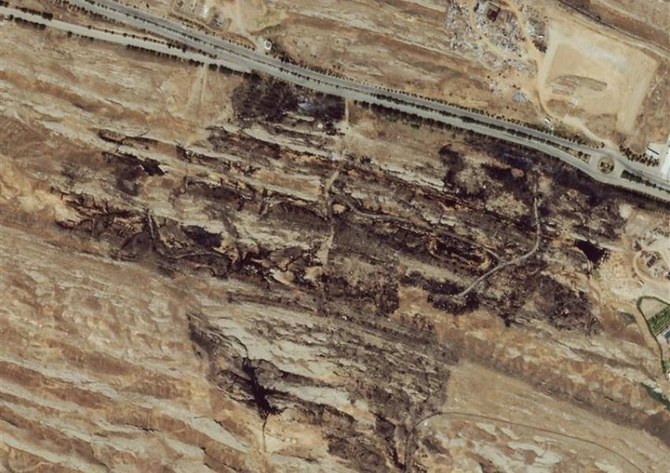JEDDAH: A massive explosion at an Iranian missile plant that shook Tehran and sent a massive fireball shooting into the night sky was almost certainly caused by sabotage, a leading security analyst told Arab News on Saturday.
The blast happened at the Khojir military explosive manufacturing and testing site in the Parchin defense industries area, in the Alborz mountains about 20 km east of the capital.
The plant, which has a hidden underground tunnel system, produces and tests artillery rockets and ballistic and cruise missiles. New satellite photos of the site showed hundreds of meters of charred and blackened scrubland.
“Although military and defense industry accidents do occur in Iran, the consensus appears to be a cyberstrike by Israel against Iran,” said Dr. Theodore Karasik, senior adviser at Gulf State Analytics in Washington, DC.
“The ongoing cyberwar between Iran and Israel is not new. Iranian cyberforces attacked Israeli infrastructure in April, specifically water and sewage treatment facilities. Israeli cyberforces retaliated the following month against Iranian facilities, military industries and ports. They attacked Shahid Rajaee Port in an attempt to shut it down.
“Although sabotage can occur from within the facility, that is doubtful. But from outside Iran, that is another story. The tactic of placing defective parts into a supply chain to create such an event cannot be ruled out either.
“To be sure, the timing of the explosion is important given continued Iranian mischief in the region. As these tensions will probably grow in the coming months, the tit-for-tat nature of cyberwar is part of a troubled security landscape. The Khojir event is a continuation of the Stuxnex virus used 10 years ago to disrupt and deter Tehran’s military industry.”
Iranian state TV said the blast had been caused by leaking gas in “a public area,” but did not explain why the incident was handled by military officials rather than civilian firefighters. The explosion on Friday appeared to have struck a plant operated by the Shahid Bakeri Industrial Group, which makes solid-propellant rockets, said Fabian Hinz, a researcher at the James Martin Center for Nonproliferation Studies in California.
The Center for Strategic and International Studies in Washington said Khojir was the “site of numerous tunnels, some suspected of use for arms assembly.” Large industrial buildings at the site visible from satellite photographs also suggest missile assembly.
The US Defense Intelligence Agency says Iran overall has the largest underground facility program in the Middle East. Such sites “support most facets of Tehran’s ballistic missile capabilities, including the operational force and the missile development and production program,” the DIA said in 2019.
Iran’s missile and space programs have suffered a series of explosions. The most notable was in 2011, when a blast at a missile base near Tehran killed Revolutionary Guard commander Hassan Tehrani Moghaddam and 16 others. Authorities officially said the blast was an accident, but conducted secret interrogations on suspicion that Israel was behind it.




















